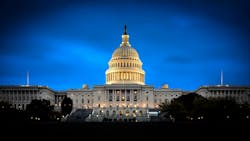How Would a Long Government Shutdown Affect Commercial Real Estate?
Editor's note: This shutdown is now the longest in U.S. history.
A stalemate over healthcare policy changes has resulted in what is, at the time of publishing, the U.S. government’s second-longest shutdown. The current shutdown, which started on Oct. 1, is nearing the 35-day record set from December 2018 into January 2019.
U.S. government shutdowns occur when Congress does not pass funding legislation to finance the federal government before the next fiscal year begins. When that happens, federal agencies shut down services and non-essential operations, while workers deemed non-essential are furloughed. This shutdown could reach a resolution at any time, but disruptions are already hitting many facets of everyday life. For commercial real estate professionals, a prolonged shutdown could include these four issues.
1. Market Uncertainty
The Bureau of Labor Statistics did not release its September monthly employment report due to the shutdown, CNBC reported. Investors who need that data to make decisions about interest rates and the health of the economy are affected by this. A continued shutdown would preclude the Census Bureau from releasing economic data on construction spending, housing, and building permits, all of which are key for anyone investing in multifamily properties, CNBC noted.
2. Delays in Federal Permits
Any development or financing that requires a permit from the federal government will be delayed, according to a report by Commercial Property Executive. This will lead to development delays.
The government shutdown in 2013, for example, impacted federally funded infrastructure projects because permit reviews by the EPA stopped, according to CNBC. Contractors and trade professionals need those permits to mobilize workers, and they depend on a certain degree of predictability for a project in order to manage labor, materials, and money.
3. Lags in Payments
Any CRE professional negotiating a government-backed lease will run into delays, CNBC noted. A prolonged shutdown could also impact REITs that serve federal agencies because they depend on government rent payments from tenant agencies. These companies may notice delays in rent payments.
Skilled nursing facilities, senior care facilities, and affordable housing projects, which use financing from the U.S. Department of Housing and Urban Development (HUD) may notice delays in loan approvals or grant funding.
4. Issues for Consumer-Driven Businesses
Retail and hospitality tenants in areas with a large population of federal workers will likely notice a drop in consumer spending, especially if the shutdown lasts for a long period, forcing furloughed federal workers to tighten their belts even further. A long shutdown could result in some of these tenants having issues with rent payments, which would impact whoever owns the building the tenants are in.
In addition to the 2018-2019 government shutdown, there have been nine other shutdowns since 1980. In 2013, a 16-day shutdown occurred over implementation of the Affordable Care Act, while a 21-day shutdown in 1995-1996, during Bill Clinton’s first term, was prompted by spending cuts, according to Delaware Online. Seven others lasted between a few hours to five days.
About the Author
Janelle Penny
Editor-in-Chief at BUILDINGS
Janelle Penny has been with BUILDINGS since 2010. She is a two-time FOLIO: Eddie award winner who aims to deliver practical, actionable content for building owners and facilities professionals.

